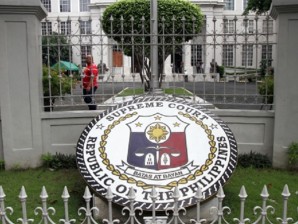SC suspends proclamation of five party-list winners
The Supreme Court on Wednesday stopped the Commission on Elections (Comelec) from proclaiming more winning party-list groups pending its resolution of a petition by the Senior Citizens party-list group protesting its disqualification from the May 13 polls.
The court ordered the Comelec to comment within a “nonextendible” period of 10 days the petition of the Coalition of Associations of Senior Citizens in the Philippines Inc.
In issuing a temporary restraining order (TRO), the high court in a three-page resolution directed the Comelec “to cease and desist from further proclaiming winners from among the party-list candidates.”
The TRO was authorized by Chief Justice Ma. Lourdes Sereno upon the recommendation of the associate justice in charge of the petition, according to Clerk of Court Enriqueta Vidal. The court is in recess and will resume its en banc session next month.
Comelec Chairman Sixto Brillantes Jr. welcomed the ruling. “I’m happy, but I would be happier if they sustain us (on the disqualification of the 12 party-list groups). The TRO isn’t bad for us. It’s OK,” he said.
Brillantes said the Senior Citizens should now focus its efforts on the court instead of the Comelec.
“Don’t cry here. You keep on crying here with us. You can now cry at the Supreme Court,” he said. “I hope this is resolved by June 30 so that when Congress opens, the party-list groups are complete and Congress would also be complete.”
The Senior Citizens received 677,642 votes and would have landed on the 10th spot in the party-list rankings, with two congressional seats, had it not been disqualified.
The Comelec has so far proclaimed 38 party-list groups, which were entitled to 53 seats in the House of Representatives. The poll body was due to proclaim five more groups.
Court resolution
In its resolution, the Supreme Court noted that the Senior Citizens “obtained a substantial number of votes which could materially affect the determination of the allocation of seats for party-list representatives.”
“Whereas, should respondent Comelec continue proclaiming winners from among the remaining party-list candidates, grave prejudice could result, not only to the petitioner but to the other party-list candidates as well,” the court said.
On May 14, the Senior Citizens filed an “extremely very urgent petition for certiorari with prayer for issuance of a writ of preliminary injunction and TRO or status quo ante order” on the Comelec resolution in November last year that disqualified it from the May 13 polls. The Comelec said the group violated public policy on term-sharing.
In its 44-page petition, the group said the Comelec action would cause “grave, serious and irreparable damage” and disenfranchise 8 million senior citizens in the country.
“The urgent issuance of a TRO is extremely needed lest the right to participate of petitioner’s senior citizens for the last two elections be lost and put to naught,” said the group, which participated in the 2007 and 2010 elections and secured one and two congressional seats, respectively.
The group went to the high court last Dec. 6 and five days later got a status quo ante order.
But on April 2, the court remanded to the Comelec the determination of party-list groups qualified to participate in the May 13 midterm elections.
On May 6, the poll body announced that the Senior Citizens was among those disqualified.
No basis
The Senior Citizens said the Comelec “committed a reversible error” in canceling its certificate of registration and accreditation on the ground of public policy on term-sharing. It said this was not a basis for disqualification.
The group also held that the alleged violation of the public policy of term-sharing happened in 2010 but the poll body’s new policy was imposed only in February 2012 and gave it a retroactive effect.
Article 3 of the Civil Code provides that in order that a law may have a retroactive effect, a necessary express provision to this effect must be made in the law, the petitioner said.
In other words, the assailed resolution was “in violation of an ex post facto principle of law, that is, the law punishes an act which is not yet punishable at the time of commission,” the group said.
The Senior Citizens also accused the Comelec of violating the group’s constitutional right to due process when it did not notify it of the grounds for cancellation of its registration and deprived it of the opportunity to be heard.
Court move unfair
In a statement, election lawyer Romulo Macalintal called the TRO “unfair and violative of the due process right of the five unproclaimed party-list groups.”
“It has the effect of suspending their proclamation without due notice and hearing. In various cases, the high court nullified any suspension of proclamation of a candidate if no notice and hearing is conducted giving such candidate a chance to be heard,” Macalintal said.
The five party-list groups were not even included as respondents in the petition of the Senior Citizens, he noted.
“To comply with due process, the high court should have directed the Senior Citizens to implead the five party-list groups as respondents and give them a reasonable period to comment,” Macalintal said.
“At any rate, the date of assumption is yet to start on June 30, hence the Supreme Court has sufficient time to act on the petition,” he added.



















